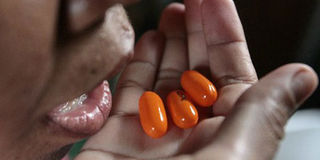Consider taking HIV/Aids fight, and the money, to rural woman

A woman living with HIV/Aids takes her dosage of antiretroviral drugs. PHOTO | FILE | NATION MEDIA GROUP
What you need to know:
- While Kenya has made quite some progress in fighting HIV/Aids, a lot needs to be done to deal with stigma.
- South Sudan says it has ratified the protocol on women’s rights but indications are that it is yet to deposit the ratification instruments with AU’s Legal Counsel office as required.
Last Wednesday was the 15th anniversary of the Protocol to the African Charter on Human and Peoples’ Rights on the Rights of Women in Africa (the Maputo Protocol).
The African Union (AU) predecessor, the Organisation of African Unity (OAU), had in 1981 enacted the African Charter on Human and People’s Rights (the African Charter), which provided for protection and recognition of different aspects of human rights but not adequately on gender equality and related rights.
Consequently, women rights groups from the continent got together to rectify the situation, leading to the African Commission assigning the drafting of a women’s protocol.
On July 11, 2003, AU member states adopted the Maputo Protocol, which came into force in November 2005.
The progressive treaty, which comprehensively addresses political, social and economic rights of women and girls, was adopted in Mozambique’s capital, Maputo.
So far, 39 countries have ratified the protocol, Kenya in October 2010, with 16 yet to do so.
WOMEN'S RIGHTS
South Sudan, the youngest state, says it has ratified the protocol on women’s rights but indications are that it is yet to deposit the ratification instruments with AU’s Legal Counsel office as required.
While it has been generally acknowledged that the Maputo Protocol has helped to move forward rights such as empowerment of women, there is a clear need to keep pushing for implementation where countries have ratified it. Abuse of women and girls, especially in the form of all manner of violence and discrimination, is still rife.
Even as they appreciate progress and “key milestones” made so far in ratifying and domesticating the critical protocol, the Nairobi-based Solidarity for African Women’s Rights Coalition (SOAWR), a network of more than 50 civil society organisations in 25 AU member states, has taken up the push for the implementation of the treaty while nudging states yet to ratify it to sign up.
As part of the Maputo at 15 celebrations in Nairobi, SOAWR, established in 2004, launched a progress-on-implementation report by countries that have ratified it, even as the coalition acknowledged challenges and opportunities to universal ratification of the same.
Most important, the women’s rights groups acknowledged the need to raise awareness on the dictates of this protocol and what should be done to ensure full execution and application.
BIGGEST SNAG
But as the new African Women’s Development and Communication Network’s (Femnet) executive director Memory Kachambwa observes, the biggest snag to the achievement of gender equality and women empowerment in the region is the hesitance by some governments to fully execute such obligations.
While it is important to appreciate that there has been fair response by the governments in signing obligations such as the Convention on the Elimination of All Forms of Discrimination Against Women (Cedaw) — an international treaty adopted by the United Nations in 1979 — the Maputo Protocol and embracing ideals of the Sustainable Development Goals (SDGs), civil society leaders such as Ms Kachambwa and their organisations rightly observe that signing of documents by governments only to end up in shelves or fail in implementation is not progress.
Governments need to demonstrate real and honest commitment to gender equality and women empowerment by, among other critical actions, executing obligations that they sign and commit themselves to, and put them into practice.
African women rights campaigners, especially, attach a lot of interest and importance to the Maputo treaty, given that it specifically addresses critical challenges — such as violence against women and girls, and key barriers to their rights and empowerment.
HARMFUL PRACTICE
Some of the issues the treaty covers are the rights of women living with HIV/Aids, the retrogressive and harmful practice of Female Genital Mutilation (FGM) and discrimination against women and girls.
Talking of women and HIV/Aids, while Kenya has made quite some progress in fighting the pandemic, a lot needs to be done to deal with stigma, especially among infected and affected women and children in rural areas.
This is mainly because of stigma surrounding HIV/Aids, taking of anti-retroviral (ARV) drugs (ARVs) among infected mothers and children is still shrouded in secrecy.
This becomes a barrier to the fight against HIV/Aids and has to be addressed if the war is to be won.
One can only hope that next week’s biennial international HIV/Aids conference in Amsterdam, the Netherlands, will come up with concrete proposals and actions.
Ms Rugene is a consulting editor. [email protected]. Twitter: @nrugene.





